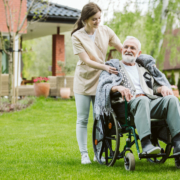Recognizing Anxiety Awareness Month in Senior Housing
Anxiety can affect anyone, regardless of age, and its symptoms are often hidden. This makes awareness essential, as recognizing the signs can lead to better support for those affected, especially in senior housing. Thankfully, May is designated as Anxiety Awareness Month to highlight this critical issue.
Importance of Anxiety Awareness Month
Anxiety Awareness Month aims to educate the public about anxiety, reduce stigma, and encourage those affected to seek support. This event holds particular importance for older adults, especially those in senior housing and related communities, where mental health concerns often go unspoken or unnoticed.
- Encourages open conversations about mental well-being in later life
- Raise awareness of symptoms that may be mistaken for age-related issues
- Promotes early detection to help prevent chronic anxiety disorders
- Supports caregivers and staff in understanding emotional needs
- Reinforces the value of emotional health alongside physical care
Never underestimate the importance of this month, as it may help improve the quality of life for your loved ones and others around them.
Recognizing Anxiety in Residents of Senior Housing
There are various reasons for anxiety in residents of senior housing, and staff and loved ones should be mindful of these. Common causes include significant life changes such as retirement or the loss of a spouse, health issues like chronic illnesses, cognitive decline, and sensory impairments. Social isolation, medication side effects, and traumatic events (including moving into a new living environment) can also contribute significantly to feelings of anxiety.
It is equally important to be aware of the signs and symptoms to recognize potential anxiety in the elderly. Some key indicators include:
- Persistent worrying or feelings of fear
- Difficulty sleeping or frequent insomnia
- Restlessness, irritability, or noticeable agitation
- Muscle tension or unexplained physical discomfort
- Trouble concentrating or making decisions
- Withdrawal from social activities or family visits
- Frequent complaints about health without clear medical causes
By being attentive to both the underlying causes and the visible signs of anxiety, caregivers and family members can offer more timely and compassionate support. Recognizing these patterns early can help improve residents’ emotional well-being and overall quality of life.
Activities to Reduce Stress and Worry
Simple activities can significantly alleviate stress and worry, ultimately reducing the occurrence of anxiety, especially among seniors. By incorporating calming activities into their daily routines, older adults can cultivate a sense of well-being and calm.
- Gentle Exercise. Engaging in light activities, such as stretching, yoga, or walking, can help ease physical tension and promote relaxation.
- Mindful Breathing. Practicing deep breathing exercises can quickly reduce stress, bringing a sense of calm to the mind and body.
- Creative Hobbies. Activities such as painting, knitting, or puzzle-solving encourage focus and creative expression, helping to distract from anxious thoughts.
- Social Interaction. Regular visits or conversations with family and friends can offer emotional support, helping to alleviate feelings of isolation and worry.
- Music or Nature Sounds. Listening to calming music or natural sounds can promote relaxation and improve mood.
- Guided Relaxation. Simple meditation or guided imagery sessions can transport the mind to peaceful settings, easing anxiety.
By incorporating these activities into daily routines, seniors can develop healthier coping mechanisms and enhance their quality of life, fostering a deeper understanding of their emotional health during Anxiety Awareness Month.
Looking for excellent community and care in Nebraska? Click here to learn all about Richmont Senior Living!
Richmont Senior Living is proud to serve Ashland, NE and the surrounding cities: Memphis, Springfield, South Bend, Greenwood, Murdock, Waverly, Murdock, Ithaca, and Chalco











